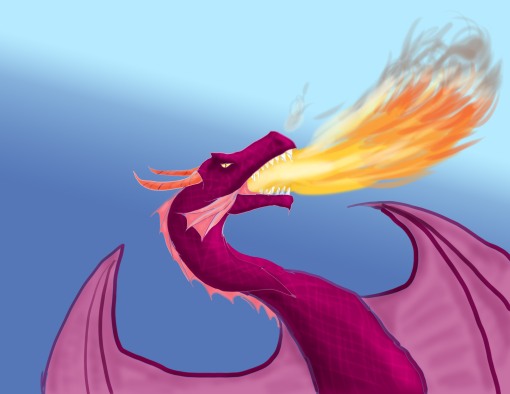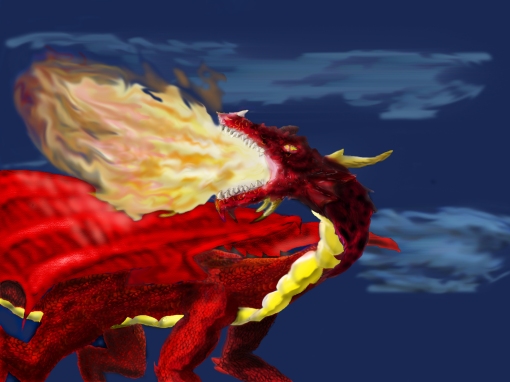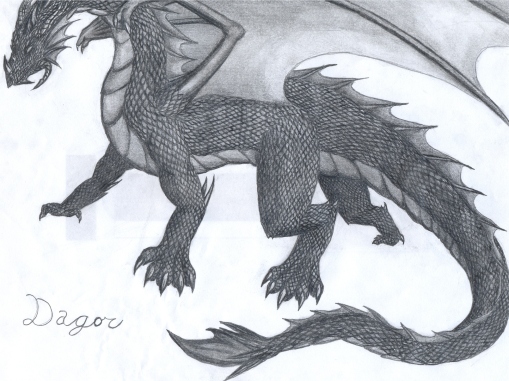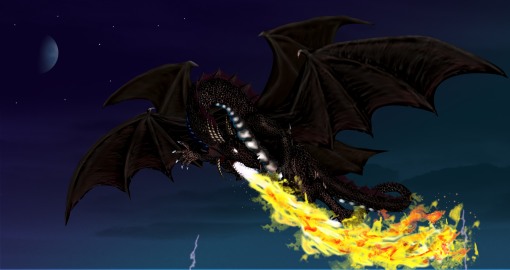
Dragons have invaded legends in many cultures of the world. From China to Europe, ancient to modern, these are probably the most famous creatures never to have existed (as far as we know). They come in many different forms and sizes, moralities, and intelligences. Some have wings like a bat and breathe fire. Others don't have wings, but still fly. The only animal in the Chinese calendar that doesn't exist is the dragon. So why are they so pervasive?
Traditional dragons have been enemies of mankind. They represent our fears and a challenge for man to overcome. They are huge, as we are afraid of things bigger than us. They can fly, going where we can't (especially before the invention of airplanes) and have greater mobility and speed, able to corner and outmanuever us. They breathe fire, something that normally only humans have access to, so they put themselves on a level with us, aside from fire's extremely destructive nature. They are similar to lizards, as opposed to us mammals, making them alien, aside from the hard scales that reflect the armor knights would wear. Many could speak and were as intelligent if not more intelligent than humans. They have keen senses and sometimes magical powers. With all these attributes, dragons represented the ultimate challenge men could face, especially in medieval Europe. Knights who could slay a dragon were the ultimate specimens of manhood, so it isn't surprising that legends show the knights of the round table and saints like George slaying dragons. Each challenge had to have a reward, so the dragons either guarded treasures or damsels or both.

Humanity doesn't have a natural enemy. While it is true some animals like wolves or tigers might kill individual humans or small groups, human society has nothing living that challenges it for dominance, aside from other societies and conflict within. So the theme of many fantasy stories is having some external force, like dragons, orcs, or even aliens, threatening humanity, to deflect the guilt we feel in being our own worst threat. It also deals with uniting humanity against a common threat, as there is an unspoken understanding that unless we have another group to fight against, we break into smaller groups and fight among ourselves, which is why utopias don't exist.
Dragons can also represent other things than threats or challenges. They can be symbols of earth or nature and might have access to ancient wisdom. They might act as godlike figures, for good or evil. They can be beautiful and represent the beauty of nature. They can even represent the human spirit, in a different form.

Some don't prefer to have dragons in their stories, but I do like them, if they're not overdone. Unlike some other tropes of fantasy, like elves and dwarves where few venture out of the set standards, dragons have a lot of potential for being used uniquely each time. Because of this, they can enrich a story instead of bogging it down, obviously when used correctly. Because fantasy is a genre of wonder, having these great beasts to wonder at fits well with the genre.
One last word on dragons. The largest land creature alive is the elephant, but they are small compared to dragons of myth. Elephants can't even jump because they would break their bones. Dragons fly. Obviously, the dragons we dream of can't exist in this world, and anyone writing about dragons might want to consider that, either changing their world or figuring out how dragons would reasonably exist. Magic is the most obvious answer, what most people use, or they just don't even want to think of the ramifications. Now you might ask, what about dinosaurs? Pterodacyls flew, and they were bigger dinosaurs than elephants. If they existed, dragons shouldn't be too much of a stretch. Except they might have lived in conditions much different than ours. I read through this site, www.dinosaurtheory.com, and I'm not sure if the science is correct, it doesn't seem to be a very popular theory, or at least widespread, but it does at least make you think. I suggest you read it just to get thinking about worldbuilding and to analyze the world we live in. It is not so permanent and common as we might think.
Here be dragons.
Reblogged from http://sageeyesblog.wordpress.com/2013/01/19/dragons/


No comments:
Post a Comment